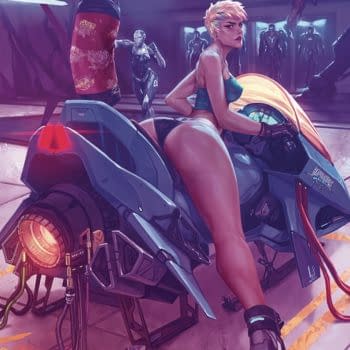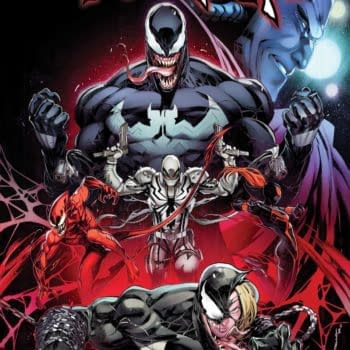Posted in: Recent Updates | Tagged:
Is This The Beginning Of The End Of The Direct Market?

The direct market, set up by Phil Seuling in the seventies, with assistance from Levitz, was a system where comic book stores could order comic books through a distributor, firm non-return orders opposed to the returnable newsstand orders that had been the previous comics industry rule. The distributor could pick a publisher's comic up from the printers, ship it across the world with everyone else's comics, collect the money and give the publisher their chunk, a higher percentage than from newsstand sales. Over the last thirty years some publishers made lots of money at this, some didn't, a lot of junk was created, and some gems shone through that would never have seen the light otherwise. Today, Diamond Comics Distribution distributes the majority of Western comics, with exclusive deals with Marvel, DC, Image, Dark Horse and more.
I was a direct benefactor of this system, from my self published books in the nineties, to the likes of Flying Friar, Civil Wardrobe, Watchmensch and upcoming Chase Variant. The road from idea, through creation, to worldwide publication and distribution was relatively quick, easy and worked. Hell, it even paid a little.
And from Bone to Scott Pilgrim to Hellboy to Walking Dead to Strangers In Paradise to Chew to Bulletproof Monk to Cerebus to Hate to it has worked for decades. Many problems along the way of course, but pre-internet it was unique. The comic shop, certain comic shops anyway, was always a place where a small press comic could stand shoulder to shoulder with a big name A-lister and not look out of place.
Online has changed everything of course, creating a much more direct approach, cutting out printers, distributors, shops and the like. But it's impossible to get your comic on there, sitting right next to X-Men, waiting to be discovered, as my X-Flies comic was…
DC Entertainment's likely shift away from the direct market as a focus wouldn't destroy Diamond in and of itself. But it could be a death of a thousand cuts. Here are a few of those possible slices.
Other venues may get exclusive products unavailable to the direct market.
DC Entertainment may choose to use Warner owned WEA to distribute graphic novels and trade paperbacks.
There may be less money spent on direct market promotions (such as the upcoming ring promotion) and less time spent on direct market retailer concerns.
Now, over at Marvel, they may choose to put trade paperback sales through Harper Collins and may also find new venues for sales. But DC has ploughed more money into direct sales support.
Additionally, Diamond's new increased minimum terms has already lost a number of books and publishers from distribution. While a very small percentage of overall sales, for some retailers they make up a larger percentage, and are part of the "long tail" system, when a title sells a number of books but over a long period. And as a result, retailers are forced to go elsewhere, in some cases cut entire lines from Diamond just so they can order them in full without getting confused.
If Diamond lose a chunk of Marvel, DC and other publishers to other distributors, Diamond may have to radically reform its operation and the direct market that we know may be over.
And then there's digital. Without Paul Levitz, DC Entertainment are likely to look further into a digital model, rather than just the original Zuda content. This will mean Marvel will have to step their up their game, and start offering titles online closer to their print sale date. Competition between the two will most likely result in increasingly closer schedules until both offer legal digital downloads on the same day as print release – or before.
If this scenario comes to pass, comic stores will certainly survive but more as specialised bookshops. Without the economies of scale of the direct market, the weekly shipment of single issue comcs which forms their backbones may shrink, have to be sourced from several distribution sources and become more expensive. And with products offered elsewhere, the regular weekly visits may begin to fall away.
The direct market could have survived, but it needed a champion like Paul Levitz at the very top. It's very possible he was the one holding it all up.
Comics will survive. The comics industry will change. But our habits, our security blanket, and in some cases our jobs, will have to change with it.
Of course, there are other options. And the possibility that Marvel will ride in to the direct market on white horse and save the day. I'll be talking about a rumour regarding that later today…











